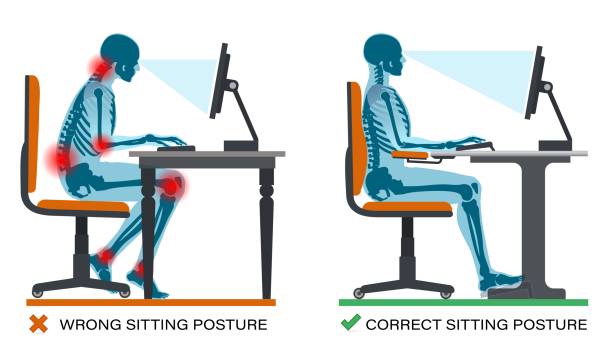
Fixing our desk posture for better health
Posture matters and can have big impact on our physical health. But fixing your desk posture doesn’t require a complete workspace overhaul. A few simple adjustments to how you sit and set up your workstation can make a huge difference.
1. Adjust Your Chair for Comfort and Support
Your chair plays a crucial role in supporting your posture.
- Sit all the way back – The backrest of your chair should support your back, especially in the lumbar region (lower back). Those with lumbar support can be particularly helpful in maintaining the natural curve of your spine.
- Adjust the height – Your feet should be flat on the floor, with your knees at a 90-degree angle. If your chair is too high or low, it can lead to discomfort and strain on your lower back.
- Use armrests – If your chair has armrests, make sure they are adjusted to a height that allows your shoulders to relax while your arms rest comfortably.
2. Position Your Desk and Monitor Correctly
Setting up your desk and monitor to encourage good posture is essential for reducing strain on your neck and eyes.
- Monitor at eye level – Your computer screen should be positioned at eye level so you don’t have to look down or strain your neck. The top of the screen should be at or slightly below your eye line, around 45-70 cm from your face.
- Keep your keyboard and mouse at elbow height – Your arms should be positioned comfortably at a 90-degree angle when typing, with your wrists straight and relaxed. Keep your mouse close to your keyboard to avoid reaching and straining your shoulders.
3. Take Regular Breaks
Sitting in one position for long periods is a major contributor to poor posture and discomfort. To avoid this, it’s important to take regular breaks throughout the day.
- Stand and stretch – Try standing up and stretching every 30-60 minutes to relieve tension and improve circulation.
- Walk around – A quick walk around your office or home can help reduce stiffness and refresh your mind and body.
4. Mind Your Sitting Position
Even if your desk and chair are set up correctly, your sitting posture plays a big role in maintaining a healthy spine.
- Sit back in your chair – Make sure your back is fully supported by the backrest of your chair. Avoid leaning forward or slouching.
- Feet flat on the floor – Your feet should rest flat on the ground, with your knees at the same height or slightly lower than your hips.
- Shoulders relaxed – Keep your shoulders back and relaxed. Avoid rounding them forward, as this can cause strain on your neck and upper back.
5. Use Ergonomic Tools
If you spend long hours at your desk, consider investing in ergonomic tools that can help reduce strain and improve your posture.
- Keyboard and mouse – An ergonomic keyboard and mouse can promote a more natural hand position and reduce strain on your wrists.
- Standing desk – If possible, try using a sit-stand desk that allows you to alternate between sitting and standing throughout the day.
- Footrest – If your feet don’t reach the floor, a footrest can help you maintain proper posture by keeping your legs supported.
The Benefits of Better Desk Posture
By taking steps to improve your desk posture, you can experience a range of health benefits, including:
- Reduced pain – Improving your posture can help alleviate neck, back, and shoulder pain.
- Increased energy – Better posture allows your muscles to function more efficiently, helping you feel more energised and less fatigued.
- Improved focus and productivity – With less discomfort and strain, you’ll find it easier to concentrate and stay productive throughout the day.
- Prevent long-term issues – Good posture can help prevent long-term musculoskeletal issues, such as chronic back pain, herniated discs, and repetitive strain injuries.
Even with the best efforts, some individuals may experience persistent pain or discomfort due to poor desk posture. If you’re struggling with ongoing neck, back, or shoulder pain, it might be time to seek professional help. Our physiotherapists can assess your posture, identify any issues, and recommend postural correction exercises, stretches, and ergonomic adjustments to improve your comfort and health. Whether you’re dealing with pain or just want to improve your overall posture, we’re here to support you.
Take aways
Your desk posture plays a significant role in your overall health and well-being. By making small adjustments to your workstation and being mindful of your sitting habits, you can prevent pain, improve comfort, and boost productivity.
Call our clinic on 07 3352 5116 or book online to learn more about how our physiotherapists can help you with your posture.







